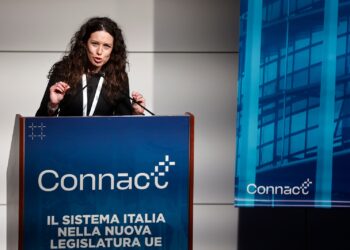Brussels – The Italian national system presents itself to Europe. The Connact showcase event brought together 22 major companies and 12 trade associations – for a turnover worth 47 percent of Italy’s GDP – with the Italian delegation of the European Parliament, EU institution representatives, and the diplomatic corps of Italy in the heart of Brussels. There were eight thematic tables where stakeholders, private, and institutional actors discussed the priorities for the European legislature that just started. The Deputy Representative to the EU, Stefano Verrecchia, opened the event, calling on the audience to “take advantage of the potential space to improve the representation of the national interest.”
After the institutional greetings of Vice-Premier and Minister of Foreign Affairs Antonio Tajani, the presidents of the House and Senate, Lorenzo Fontana and Ignazio La Russa, and the Vice-President of the European Parliament, Antonella Sberna, representatives of the diplomatic corps, who daily weave the relationships and defend the country’s interests in the maze of Brussels-based bodies and institutions, took the floor. Starting with Federica Favi, Italy’s ambassador to Belgium, who was “excited” about an initiative that “fits perfectly into the constitutional dictate” that envisages “the right to participate in the definition of national and European policies.”

Favi assured that “the diplomatic system works in Brussels to strengthen the country’s system and all its expressions.” It is a task carried out with dedication until the last day by Stefano Verrecchia, Deputy Permanent Representative of Italy to the EU, who is about to take office as head of the Foreign Affairs Department of the Council Presidency. He played a crucial role in some of the “key battles” in the past EU legislature, particularly in “seeking a balance between industrial interest and climate ambition.”
According to Verrecchia, Italy has “always been at the center” of the European climate agenda, reminding the other 27 member states “how important it is to avoid deindustrialization.” The ambassador cited, for example, “the disaster” of the automotive sector. “If we are forced to ask our manufacturers to acquire emission allowances from non-European companies, perhaps no work has been done regarding the famous strategic autonomy,” he noted bitterly.
Then Andrea Orizio, permanent representative to the European Political and Security Committee (PSC), spoke, recalling the “central role” that Italy “is called upon to play” because of its “ability to build consensus.” Finally, Marco Peronaci, permanent representative to NATO, which has its headquarters just a few kilometers from the EU institutions, praised “the exercise of system and dialogue so fundamental in the European capital” that Connact initiated. According to Peronaci, the “polycrisis” phase of the world order requires a “complementarity between NATO and EU action,” which becomes “an existential requirement for European security.” Just days before Donald Trump takes office in the White House, the goal can only be “the resilience of the transatlantic relationship.”
The Italian diplomatic corps in Brussels raised several complex issues. These are the ones framed by the ConnAct working groups, where the 34 private promoters –representing more than a million businesses — sit face-to-face with policymakers who can steer the European legislative process of the next five years and match them as closely as possible with the interests of the national country system, according to the priorities that will emerge from the new ConnAct platform.
English version by the Translation Service of Withub






